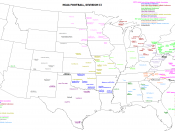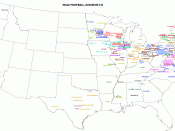In today's world of big-time college athletics there are huge amounts of revenue being brought into the universities by athletes. However, some of the athletes that make the money for their schools can't even afford to buy the team sweatshirt that they are making popular. Thus, it is difficult for the athletes to resist the temptation of accepting compensation for their performances. Not surprisingly, the media is filled with stories of the NCAA scandals and allegations surrounding star athletes receiving money and gifts from agents, advertisers, coaches, and even colleges. I believe that NCAA college athletes should be compensated because of the large amounts of revenue they generate for their schools. If they were compensated, it could deter athletes from entering the draft before graduation. Since the NCAA prohibits athletes from having a job during the school year, these players need some type of income.
First, the amount of money generated by college athletics is staggering.
For example, the Miami Hurricanes football team raised $517 million for their school in a five-year period of time (Wolff, 'Broken' 25). Similarly, the Washington Huskies football program earns $1.4 million in television revenue yearly (Looney 43). Dick DeVenzio, in his book, Rip-Off U., supposes that if each member of a premier NCAA basketball program were to receive just half of the gate receipts from one game - not any other revenue but the gate receipts - the player would receive $120 thousand (28).
Since colleges and universities make a fortune from their athletics, it is only right that the athletes share this revenue. It is like someone working a steady job and turning the paycheck back to his employer. Being an NCAA Division I football or basketball player is comparable to having a nine-to-five job, plus being a full time student. Raul Bey,

![Zărneşti, Romania. May 1994 [Photo by CM]](https://s.writework.com/uploads/0/5349/z-rne-ti-romania-may-1994-photo-cm-thumb.jpg)
